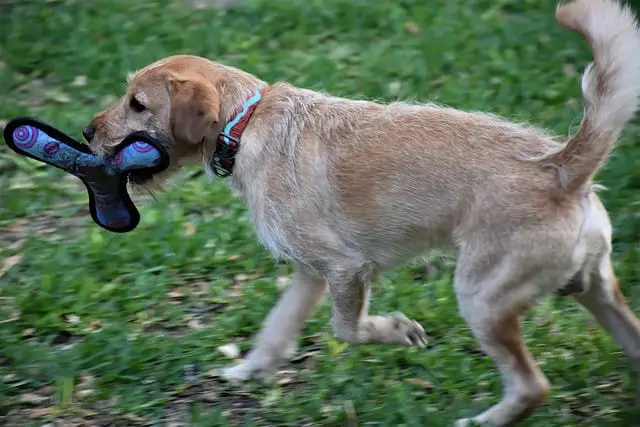A lab is a high-energy dog. Many believe having a Labrador Retriever in apartment complexes is impossible. Can a labrador live in an apartment setting? Yes, they can. Training and mental stimulation make labradors apartment friendly.
Labrador Retrievers are active dogs who need regular exercise, so it’s important to ensure they get enough physical activity. Take them for daily walks or runs, play fetch in the park, or enroll them in agility classes. Teach them new tricks and play games.
Do Labrador Retrievers Need a Lot of Space?
Labradors are accepted by the American Kennel Club! They are very intelligent dogs who are friendly. However, like all dogs, Labrador retrievers need space – to exercise, play, and relax.
A Lab needs about 1-1/2 acres of space to run and play and another 1-1/2 for each additional family member. If your home is smaller than this space, looking for a different dog breed or a puppy may be best.
Labs love staying active and need plenty of room to run and play. Providing enough space for a lab may be difficult if you live in an apartment or condo. Consider other dogs – such as a Jack Russell Terrier or a German Shephard – if you don’t have ample space for apartment living.
Can Labrador Retrievers Live in A Small Apartment?
Yes, Labradors can live in small apartments. However, they are active and energetic dogs and won’t be as happy living in a small space with little room to run and play.
However, if you can provide them with enough exercise and stimulation, a Labrador will adjust well to living in a small space. Some tips for providing your Lab with the exercise and stimulation they need in a small space include:
- Walks around the block
- Playing fetch in a dog park nearby.
- Provide them with toys that can be played with indoors, such as a Kong toy or a Frisbee
- Having regular chew toys to enforce chewing habits
- Incorporating proper training into their daily routine, such as obedience training or agility classes

What Makes A Labrador Retriever Suited For Apartment Living?
Labradors are known for their gentle and friendly personalities, which makes them great apartment dogs. Most importantly, they are relatively low-maintenance animals. Finally, Labradors are known for protecting their families and property, making them excellent watch dogs.
Behavioral Training To Make Apartment Life Work with a Labrador
One of the most important is keeping your pup’s coat clean and tangle-free. Invest in a good brush regularly to prevent mats from forming.
- You should also vacuum regularly to help manage your pup’s shedding fur.
- Choosing flooring that is easy to keep clean is also essential.
- Hardwood or laminate flooring is ideal, as it is easier to clean up spills or accidents than carpeting.
Finally, ensure plenty of space for your pup to move around and play, even if it means investing in some furniture or toys that can be easily moved around the space. Behavioral training is imperative to prevent any chance of destructive behavior in your lab.

Create a Good Routine for Your Labrador Retriever
The best routine for a Labrador retriever living in an apartment complex may vary depending on the individual dog’s personality and habits. However, some tips for creating a good routine include:
1. Establish regular periods of time for feeding and walking your dog. This will help to minimize disruptions in the apartment and help to keep everyone on schedule.
2. Provide plenty of toys and stimulation to entertain your Labrador retriever. This will help to keep them mentally stimulated and relaxed, which will help them to stay healthy and happy.
3. Keep your Labrador retriever confined to designated apartment areas, so they do not damage furniture or other property.
4. Train your Labrador retriever quickly and effectively using positive reinforcement techniques such as rewards and praise. This will help instill good habits and make labradors apartment-friendly.

Locate A Dog Park- Minutes Of Exercise
- Check with your landlord or property management company to see if they have any common areas or courtyards that can be used for daily exercise.
- Check with local pet-sitting services to see if they offer dog-walking services that can be scheduled around your schedule.
- Find a dog park or nature trails close to your apartment that can be used for a quick walk or jog.
- Purchasing a dog fence or gate to provide additional security and privacy for your labrador while you’re away from home.
Find Indoor spaces such As Doggie Daycare
Look into dog daycare facilities, which offer a safe and comfortable environment for your pet while you are away.
These facilities typically charge a monthly fee, and some may also offer weekend or evening hours. Another option is to consider opening up your own small private dog run. This can be a great solution to make labradors apartment-friendly if they don’t have enough space to care for their labrador regularly.
Create Quiet Spaces to Make Labradors Apartment Dogs
- Install a door or gate that can be closed to create a private space for your dog.
- Install air conditioners and window units strategically to ensure your dog has a comfortable place to rest and relax during hot weather.
- Install screens on windows to keep flies and other insects out, and place a fan near the dog’s bed to circulate air.
- Reduce background noise levels and provide an environment where your dog can relax without distraction.
Provide Toys for Mental Stimulation
- Buying toys from a local pet store. Chew and tug toys, puzzle games, and rubber duckies.
- Buy toys that use materials safe for dogs, such as stuffed animals, Kongs, and dog balls. Using these materials, you can also make simple games such as fetch or hide-and-seek.
- Come by once a week and provide your labrador with a new toy to play with. Hire a professional dog walker
As owners, supervise your labrador while he plays with the toy to avoid getting hurt or bored. And remember – always provide plenty of fresh water and food when leaving your labrador home alone with a toy in case he becomes distracted or thirsty.

Potty Training
Toilet training your labrador can be challenging, but it can be done with patience and diligence. Before beginning the toilet training process, understand your Lab’s personality and how they function best.
Toilet training an active dog who loves to run and play outside will be more difficult than if your Lab is a laid-back dog and prefers to stay inside. To potty train, ensure that your lab has adequate access to areas for potty outside the home. Train your Labrador retriever to use the bathroom indoors for potty breaks:
1. Begin by teaching your Lab how to sit and wait for you at the bathroom door. Once your Lab sits calmly at the door, let them into the bathroom.
2. Once your Lab is inside the bathroom, place them on their back on the toilet. Hold their paws down so they cannot move them, and flush the toilet once they have peed to mark it as his territory.
3. After your Lab has successfully adapted to bathroom breaks, slowly increase the time interval between each trip until they go on a regular schedule every time they need to go. Be patient – it may take up to several weeks for him
4. Make him adapt to crate training as that can work wonders.

Socialize
- Ensure your dog has ample stimulation and playtime when not living in the apartment. Help him get used to the new environment and make him less likely to become territorial or reactive around other dogs.
- Keep your dog supervised when outside – even if he is wearing a collar and leash – to prevent him from getting into trouble.
- Take regular walks with your dog – this will give him plenty of exercises and help him get acquainted with his new surroundings.
Maintain Regular Vet Appointments
To maintain regular vet appointments when living with a labrador in an apartment, follow these tips:
1. Keep a record of your vet visits and vaccinations in a notebook or calendar. Remember to schedule future appointments and track your pets’ last vaccinations and check-ups.
2. Make arrangements for someone to take your labrador to the veterinarian when you cannot attend the appointment. This person should know your pet’s history and current health conditions.
3. Arrange for regular pet care when you cannot take your labrador to the veterinarian. This might include providing fresh water and food, cleaning up after your pet, and walking or playing with them as often as possible.
Be careful as labradors suffer from issues like hip dysplasia and a small apartment living can aggravate it.
How Much Exercise Is Good For Labrador Retrievers?
There is no one-size-fits-all answer to this question, as the best exercise for a Labrador at any growth stage depends on its individual needs and lifestyle. However, some general recommendations for exercise for Labradors include:
1. Playing fetch: A natural game that is fun for both dog and human, playing fetch can help keep your Labrador mentally and physically active.
2. Hiking: A great way to get your Lab out of the house and into nature, hiking can provide your dog with several health benefits, including improved cardiovascular fitness and bone density.
3. Training: Like playing fetch, training your Lab can be a fun and rewarding experience that helps develop obedience skills and strengthens the bond between you and your dog.
4. Running: A low-impact exercise that is gentle on joints and easy on the Palest, running can be a great way to get your Labrador moving and healthy.
5. Playtime in small groups: Like people, labs occasionally enjoy mixing with others (especially their family members) in an activity or play set. This can help foster socialization and make you happy and content indoors and outdoors.

Challenges Of Having Labrador Retrievers In An Apartment
One of the biggest challenges to making labradors apartment dogs is finding ways to entertain them. Because they need plenty of physical activity, finding ways to engage your pup is crucial. Investing in interactive toys such as treat dispensers or puzzles can be expensive. Another common challenge is managing their barking.
Labradors are known for their loud bark, so if you live in close quarters with other people, you must train your pup not to bark excessively. Set clear rules about when and where barking is acceptable, and use positive reinforcement when they obey.
FAQ: Are Labradors apartment dogs?
Can Labradors Be Indoor Dogs?
Yes, Labradors can be indoor dogs. They are adaptable and easy to housetrain. However, there are a few things to keep in mind when introducing a Lab into an indoor home:
- Ensure the home is adequately ventilated so the dog can access fresh air and not overheat.
- Make sure the floor is nonslip and easy to clean – a Lab puppy might be unable to walk on slippery surfaces.
- Lab owners must ensure that the home has plenty of chew toys, as inactivity can cause destructive behavior in chewing.
Is It A Good Idea To Have A Dog In An Apartment?
It depends on various factors, including the apartment’s size, layout, and noise level. Some people feel that having a dog in an apartment can make a more comfortable and pleasant living space.
Others believe dogs can be disruptive and noisy. It is essential to consider your personal needs and preferences before deciding whether or not to have a dog in an apartment.
Are labs good apartment dogs?
Labradors tend to do well in apartments, as they are low-maintenance pets. They require minimal daily care and enjoy playing fetch or outside interactive activities.
If you plan to keep a labrador as a pet, consider the size of the apartment and the type of maintenance required, as these dogs can be quite active. Labradors also need regular exercise, so living in a city with ample opportunity for running around may be best.
Are There Any Downsides To Having A Dog In An Apartment?
A labrador retriever needs plenty of physical stimulation and mental exercise, which can be challenging to provide in a small space. They are also prone to barking, so this could be an issue if you have close neighbors. Finally, their shedding can be challenging when living in a ground-floor apartment.
Can Labradors be left alone?
Labradors are prone to separation anxiety and don’t do well for long without their owners. Better not to leave them alone for long.
Do Labradors need a lot of space?
Yes, they do, but with training, they can adapt to living anywhere
Is it hard living in an apartment with a dog?
If it is small, it can get difficult, but with proper obedience and crate training, labrador
retrievers can adapt easily.
Author Profile
- Site Owner And Dog Lover
-
Aritra, the founder of Labradorandyou.com, is a lifelong dog lover whose passion ignited for Labradors for their loyalty and intelligence. With extensive research and personal experiences, Aritra has become a Labrador expert, offering a rich resource on the breed. Labradorandyou.com provides reliable, timely, and evidence-based information, including Labrador-specific product reviews, training techniques, and care tips.
Labradorandyou.com was born out of Aritra's passion and his desire to share his profound knowledge about the breed. The site serves as a comprehensive resource, offering a wealth of up-to-date information for Labrador owners and enthusiasts alike
Also by the author
-
 Lab-TypesNovember 17, 2023Old Dog Seizures: Causes, Symptoms, and Treatment Options
Lab-TypesNovember 17, 2023Old Dog Seizures: Causes, Symptoms, and Treatment Options
-
 Lab-TypesNovember 17, 2023Why Is My Dogs Poop Yellow? 8 Reasons & Solutions
Lab-TypesNovember 17, 2023Why Is My Dogs Poop Yellow? 8 Reasons & Solutions
-
 ReviewsNovember 17, 2023The Only Hill’s Science Diet Review You Need To Read
ReviewsNovember 17, 2023The Only Hill’s Science Diet Review You Need To Read
-
 Lab-TypesNovember 17, 2023How To Adopt An Emotional Support Dog?
Lab-TypesNovember 17, 2023How To Adopt An Emotional Support Dog?





